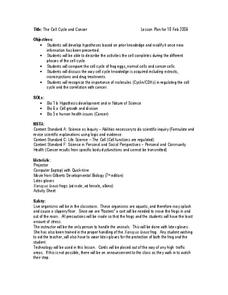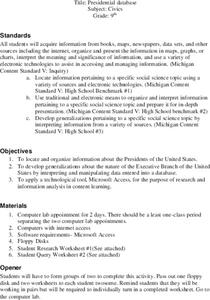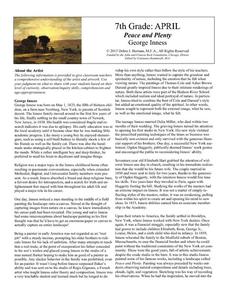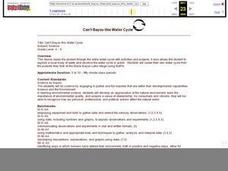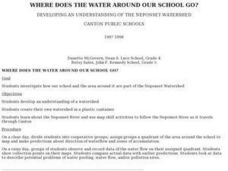Curated OER
Introduction To Pests
Students investigate common pests and match pests to their respective pictures. In a group discussion, students explore the basic needs of pests and share personal pest stories. They examine common self-protection measures. Using the...
Curated OER
Suitcase, Parfleche and 'Isaptakay
Third graders explore farfeche and how the Nez Perce people use natural materials to derive colors for their artwork. They explore traditional paints and dyes used by the Nez Perce and create their own parfleche 'isaptakay.
Curated OER
Tracking the Weather Using Technology
Fourth graders explore the use of technology to monitor and forecast weather. They investigate the different types of weather monitoring and forecast tools. Students interpret radar images and discuss the traditional types of weather...
Curated OER
Journey of the Salmon
Third graders predict salmon migration routes and explore how dams affect the salmon migration. They explore the cultural significance of salmon to the Nez Perce people and design technology to aid salmon migration.
Curated OER
The Cell Cycle and Cancer
Students compare and contrast the cell cycle of frog eggs, normal cells, and cancer cells. They watch a video about early development of the frog embryo, generate a hypothesis in small groups, and listen to a teacher-led lecture. ...
Curated OER
Testing the Hypothesis
Students create and conduct various experiments to determine the origin of a family artifact, and then determine whether their results were successful. Students summarize their results and evaluate whether their hypotheses were correct.
Curated OER
Exploring the Celestial Neighborhood
Ninth graders study the origin and organization of the solar system. They investigate the Earth's place in the system and how planetary motions explain natural phenomena observable from Earth.
Curated OER
Presidential Database
Ninth graders research the Presidents of the United States. They develop generalizations about the nature of the Executive Branch using the researched information. Students complete a Query worksheet about the Presidents.
Curated OER
Illustrated Senses Poem
Students choose a natural object found in Yosemite and writes a poem using their senses.
Curated OER
Reopen: A Study of Five Closed Mines
Students analyze data to determine which of the fived closed mines would be beneficial to have reopen. They acquire knowledge of rocks and minerals in the area to give reasons why that mine should open again. Students gain knowledge in...
Curated OER
Destination Mars!
Fifth graders view Mysteries of Earth & Mars Video on DVD and record thoughts in their online journal. They record data in a spreadsheet about each planet then form a theory of the best time to launch a space craft from Earth to land...
Curated OER
Earth/Globe (poles & equator)
First graders create his/her own paper mache earth and label the poles and equator. The land masses can be added and labeling of specific bodies of water. The paper mache earth can then be used to discuss the sun, moon, and the earth and...
Curated OER
Lichens as Air Quality Indicators: A beginning lichen identification study (2003
Students use GPS and trees to explore lichens and air quality.
Curated OER
Just How Small is a Nanoparticle?
Students determine the size of a nanoparticle. In small groups, they calculate the actual size of a particle shown in a photo, and discuss how they arrived at their answers.
Curated OER
Aerology- The Study of Mars
Students investigate various aspects of the planet Mars. They examine a core sample that is simulated to make observations. Then compare the known sample with one that is unknown and differentiate between the two. Students hypothesize...
Mascil Project
Design and Build Your Own Vacuum Cleaner, Hair Dryer or Toy Car
No vacuum cleaner? No problem, just build your own. Scholars apply knowledge of currents to build a model of either a vacuum clear, a hair dryer, or a toy car. While the class completes the activity, instructors consider gender...
Concordia University Chicago
Peace and Plenty by George Inness
Learners will need to discuss the Civil War to truly understand the painting Peace and Plenty by George Inness. They'll analyze the painting in terms of context, style, and technique. Then, they'll experiment with light and composition...
Curated OER
Creeping Sheets of Ice
Students conduct scientific investigation in which they observe glacial
effects on landscape, develop and explain their own theories of how glaciers change land, and demonstrate understanding and explain basic motion and force principles.
Curated OER
Can't Bayou this Water Cycle
Students identify the stages in the water cycle. They observe a local water source and view the cycle in action. They create their own water cycle using software.
Curated OER
Where Does the Water Around Our School Go?
Pupils in groups, map quadrants of the area around the school and make predictions about the direction of waterflow and zones of accumulation that will occur when it rains. Then when it does rain they check to see if their prediction...
Curated OER
Life Cycles of Plants
Students discover the general life cycle of a plant, the parts of a plant, and what it needs to grow. They plant bean seeds and discuss the parts of a plant and what it needs to grow.
Curated OER
Fishkill
Students analyze data to determine the effect of thermal pollution on a certain species of fish. They graph temperature and dissolved oxygen and make inferences on the impact a change in temperature could have on the fish. As a class...
Curated OER
Converting Metric Units and Prefixes
Students investigate the length of various objects. In this measurement lesson, students convert one metric unit to another. They explain the importance of a uniform system of measurement.
Curated OER
Webbing out Electricity
Fourth graders identify electricity as a form of energy that is associated with common household products. They utilize technology as an aid in which they can graphically organize their thoughts.






